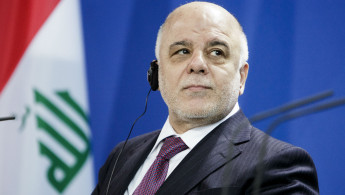'Iraq retains legal right to hold countries that support terrorism accountable': PM
Iraq retains its legal right to hold accountable countries that support terrorism, Prime Minister Haider al-Abadi told the Saudi king, during his first official visit to the kingdom on Monday, according to a press statement.
Abadi explicitly said that Baghdad would not accept the support of terrorist groups, nor will it cower from its right to hold countries which support terrorism accountable, in what seems to be a dig at the kingdom.
The comments were made during Abadi's first official visit to the kingdom since becoming prime minister, accoring to Iraqi MP Abdullah al-Naili.
Meanwhile, a joint statement said the neighbouring countries, which have suffered with years of strained ties, made a "qualitative leap" in relations.
The talks - attended by Saudi King Salman bin Abdul Aziz, Crown Prince Mohammed bin Nayef and Deputy Crown Prince Mohammed bin Salman - stressed the need "to explore opportunities to support economic and trade relations," however reports said it made no mention of Gulf tensions with Qatar.
However, the two sides agreed to intensify efforts against extremism and "terrorism".
After a quarter century without diplomatic relations, which were cut following Saddam Hussein's 1990 invasion of Kuwait, Riyadh sent an ambassador back to Baghdad last year.
But he left amid controversy, reflecting the challenge of improving relations despite Abadi's support for better ties.
Abadi's visit came with the Gulf region in turmoil after Saudi Arabia, the United Arab Emirates and other allies cut ties with Qatar some three weeks ago.
They accuse Doha of supporting extremist groups, including some backed by Iran, however Qatar strongly denies the charges.
Abadi, from his country's largest Shia political bloc, is to also set to visit Kuwait and Iran - Saudi Arabia's regional rival.
Riyadh has long expressed concern about Iran's alleged interference in the region, including through Iraq's Hashed al-Shaabi paramilitary group, which has played a major role in reclaiming parts of the country seized by the Islamic State group in recent years.





 Follow the Middle East's top stories in English at The New Arab on Google News
Follow the Middle East's top stories in English at The New Arab on Google News
![Israeli forces ordered bombed Gaza's Jabalia, ordering residents to leave [Getty]](/sites/default/files/styles/image_330x185/public/2176418030.jpeg?h=a5f2f23a&itok=_YGZaP1z)

